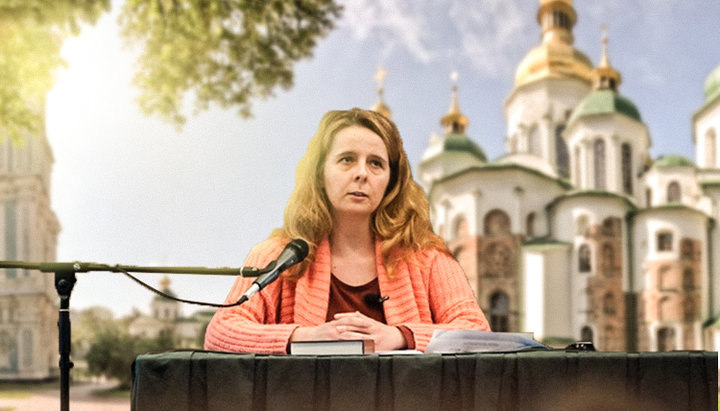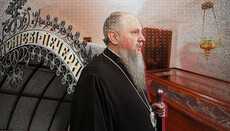The new “chief for religion”: who is she and what the Church should expect

The main candidate for the post of head of the Service for Freedom of Conscience and Ethnic Policy is Elena Bohdan, a grant-eater and supporter of Church liberalization.
The Minister of Culture, Youth and Sports Vladimir Borodiansky has finally selected a candidate for the post of head of the State Service for Freedom of Conscience and Ethnic Policy. This candidate was the assistant professor of sociology at the National University “Kyiv-Mohyla Academy”, Ph.D. in Sociology Elena Bohdan.
What is she, what are her views on religious issues and state policy in this field, and what changes await us if the Cabinet of Ministers approves her candidacy?
Elena Bohdan is a sociologist. She received basic education at the National University “Kyiv-Mohyla Academy”. Further went grants: Westminster College, Oxford University, London School of Economics and Political Science, University of Toronto, Central European University, University of Tartu, Stanford University, Duke University in the USA.
Such an abundance of grants makes it possible to attribute Elena Vladimirovna to the conditional category of “Soros grant-eaters”, the presence of which in power President Vladimir Zelensky has recently recognized. These people, as a rule, do not have real experience in public administration, but they are completely filled with the ideals of liberalism in its Western sense.
In 2007, Bohdan defended her Ph.D. thesis on the topic "The Role of the Social Institute of Religion in the Processes of Democratization on the Example of the USA" at the Kyiv Mohyla Academy The abstract of her dissertation, which is available on the website of the V. I. Vernadsky National Library, contains quite interesting conclusions from Bohdan's scientific research. She believes that the social institution of religion, i.e. the Church, is incompatible with the democratic system if the Church is characterized by “dogmatization, behind which the adequacy of perception of reality is lost and there is resistance to any reform efforts”, and also if “the clergy is organized hierarchically and the foundation of religious cells is possible only with the permission of the higher clergy". Bohdan believes that "such an organizational feature is in conflict with democratic principles".
Is it necessary to say that in the Church of Christ there are doctrinal statements that are binding for its members and are not subject to any reform? Needless to say, the Church is hierarchical, and the foundation of Orthodox communities is possible only with the permission of the ruling bishop of the diocese? That is, Bohdan does not leave the Church the right to exist in a democratic society. She believes that because of “intense democratization processes, it is more likely that such a religious institution will be forced either to adapt to democratic trends or eventually give way to new religious movements”.
According to Bohdan, the Church is incompatible with the democratic system if it is characterized by "dogmatization, behind which the adequacy of perception of reality is lost and there is resistance to any reform efforts”.
That Bohdan came to such conclusions as a scientist is her right. Worse is a different thing: she believes that the state has the right to interfere in the internal affairs of religious organizations. In the summer of 2018, at the round table "Do Ukrainians support the creation of local autocephalous Orthodox Church?”, Bohdan stated that if the majority of those who were surveyed supported the creation of an independent Church, the state should actively participate in the formation of such religious organization: "Is this process possible without the active participation of government representatives? <...> This is what Ukrainian politicians should work with. And in this way, they take on the responsibility that the leaders of several other societies have already taken".
Sociologist Elena Bohdan may not be aware of the constitutional norm, according to which the state should not interfere in the affairs of the Church. But the high-ranking state official Elena Bohdan is obliged not only to know this norm but also to strictly observe it.
If she treats the Constitution the same way as officials during the presidency of Petro Poroshenko, the threat to the Church will be another of her convictions, namely, gender equality in the Church. Equal rights for women, including to the priesthood and episcopate.
In the article "Women’s Right to Priesthood in Christianity: Controversial Present and Inevitable Future?" for the gender information and analytical centre "Krona", Bohdan states: "Proponents of equality insist that any discriminatory provisions against women in the New Testament are due to the historical context dominated by patriarchal views and practices.” Women's claims to the priesthood are allegedly based on the words of the Apostle Paul: " There is neither Jew nor Gentile, neither slave nor free, nor is there male and female, for you are all one in Christ Jesus." (Gal. 3: 28.) This understanding of the words of the Apostle Paul can only cause bewilderment.
And although in this article Bohdan tries to sound neutral on the subject, citing the arguments of both supporters and, to a much lesser extent, opponents of the female “priesthood”, the last paragraphs of the article leave no doubt as to her commitment to the idea of the female "priesthood":
"Moreover, the intensity of resistance to the discussions on female priesthood and the concentration of negative emotions around them are sometimes reminiscent of the times of movements for granting women suffrage. In the U.S., for example, at the turn of the 19th and 20th centuries, opponents of women's suffrage movement were frightened that the appearance of a woman at the polling station with a ballot in her hands would destroy the whole natural order of things, particularly that women would grow beards and lose breast milk. It is ridiculous for us today to read about such fears: women's right to vote and be elected is taken for granted in the United States, Ukraine and many other countries of the world. And vice versa: proposals to deprive women of suffrage would cause great indignation in our society at present. Perhaps, after a while, our descendants will be equally surprised to read historical studies on how intense was the resistance to the initiative to give women equal opportunities to be religious leaders with the official status of the clergy, in particular the right to head Churches and conduct all sacred rituals of religious services?”
Elena Bohdan expects that in the future the traditional resistance of the Church to the female priesthood will be perceived with surprise.
What public policy will be pursued by a person with similar views or rather a similar misunderstanding of either the essence of the Church or the laws by which She has lived for 2,000 years?
But it is possible that nothing of the kind, at least we would very much like to believe in it. The likely appointment of Elena Bohdan to the post of head of the State Service for Freedom of Conscience and Ethnic Policy should be taken in the context of all the changes in the Ukrainian government, including personnel. And these changes mean that a military solution to the conflict in the Donbass is slowly getting off the agenda. The political settlement is becoming relevant. This is evidenced by the replacement of the head of the Office of the President Andrei Bohdan with Andrei Yermak, who is in charge of the negotiations on the Donbass, and the latest statements by Vladimir Zelensky about the need for a peaceful resolution to the conflict.
The President’s last words that the local elections in the Donbass could take place this autumn are generally sensational. In an interview with “Interfax-Ukraine”, Zelensky admitted that the elections in the Donbass will be held simultaneously with the voting throughout the country. Moreover, the conditions for this should be the end of hostilities and the withdrawal of "foreign armed groups".
But until recently, the Ukrainian authorities have categorically denied the possibility of holding elections until the border with Russia goes under Kiev’s control.
In this trend of establishing peace in the Donbass, both people who ensure the maintenance of military tension in the corridors of the Ukrainian power and structures aimed at maintaining a militant agenda in Ukrainian society become unnecessary. And the Orthodox Church of Ukraine (OCU) was precisely distinguished by this extremely militant rhetoric. It is enough to recall that the head of the OCU Epiphay Dumenko was the only religious leader who refused to participate in the recording of a peaceful video message to the residents of Donbass.
Yaroslava Mishchenko, an employee of the “Ukrinform” news agency and an active opponent of the UOC, perceived the appointment of Bohdan as the threat to the OCU. “The President’s Office is preparing the destruction of the new Church”, she entitled her post on Facebook.
In the new HR policy trend of Vladimir Zelensky, belligerent people in power are becoming unnecessary.
Indeed, this is a big exaggeration. Not only the Office of the President is not preparing “the destruction of the new Church”, but the supporters of the UOC are not striving for this. The only thing that representatives of the UOC ask is for the Ukrainian authorities to observe Ukrainian laws in the field of religion. To prevent the violation of religious rights, the seizure of churches, violent acts against the clergy and believers, illegal re-registration of communities to the OCU. These requirements can hardly be called the "destruction of the new Church". Although, apparently, without all this, it really cannot exist.
Indeed, the government will not oppose the OCU but will continue to support it. But such an aggressive fighter against the canonical Ukrainian Orthodox Church like the previous head of the State Service for Religions, Andrei Yurash, is also no longer needed. Therefore, they appointed Elena Bohdan, an advocate for the creation of an “independent Church”, gender equality and other liberal values. Trained in many Western universities and fed there with the ideals of democracy. But on the other hand, not as militant-minded as her predecessor.
The authorities do not need a religious conflict right now. So, the Minister of Culture Vladimir Borodiansky said that no one will take the Lavras from the UOC. The authorities need everything to be more or less peaceful. Therefore, what to expect from the new "chief for religion"? It seems that nothing special.











